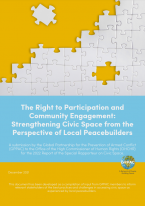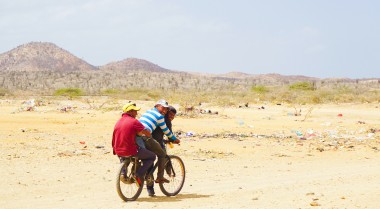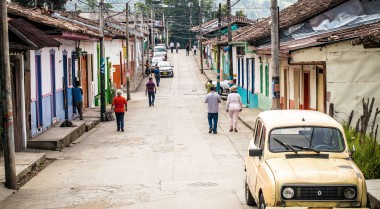
The Right to Participation and Community Engagement: Strengthening Civic Space from the Perspective of Local Peacebuilders
Human Rights Council (HRC) resolution 47/3 on “civil society space: COVID-19: the road to recovery and the essential role of civil society” requested the Office of the High Commissioner for Human Rights to prepare a report that examines in detail the key challenges being faced by civil society, both online and offline, as well as best practices. The findings will be presented in a report at the HRC Session in September 2022. The following document is our network's contribution to the report.
Where do the Human Rights of Local Peacebuilders Currently Stand?
Peace globally will only be sustainable if human rights of local peacebuilders are guaranteed and they can take meaningful roles in the decisions that affect them through the institutionalised channels of systematic engagement at all stages of relevant policy and programming. Faced with the imminent risk of conflict, fragility and shrinking civic space, local peacebuilders advance human rights, build community resilience and facilitate dialogue, including in most hard-to-reach areas. As such, they effectively contribute to peacebuilding, sustaining peace and conflict prevention.
Ensuring local peacebuilders benefit from the full scope of human rights requires guaranteeing their full protection, participation and an enabling environment for their work.
The following three factors enable meaningful and international inclusion of local peacebuilders in peacebuilding, sustaining peace and conflict prevention:
- Participation of local peacebuilders is critical to achieve sustainable peace. In this, the participation of local peacebuilders must be inclusive and diverse, as well as institutionalised and systematic, incorporated into all stages of the peacebuilding process, and provide local peacebuilders with an equal opportunity to influence the decisions that affect them.
- Protection of local peacebuilders must be ensured. Protection of local peacebuilders requires extending existing international legal protections and empowerment efforts that include a holistic “package of services” that enable capacity and opportunity for local peacebuilders to adjust to the situation on the ground.
- An enabling environment must support local peacebuilding work. An enabling environment for local peacebuilders includes fostering an open civic space where people can exercise their Right to Political Participation and access to information, ensuring quality and quantity of financing for their work, and strengthening accountability mechanisms for the UN and Member States to uphold existing commitments to support local peacebuilders.



